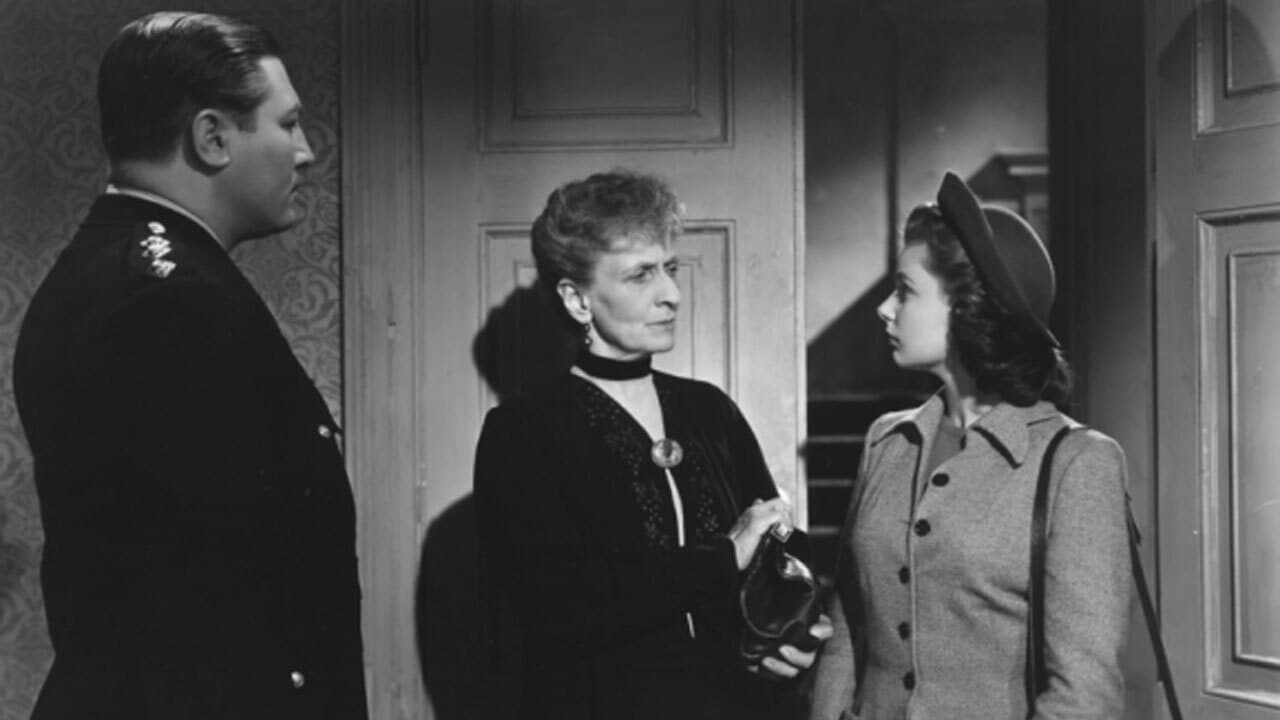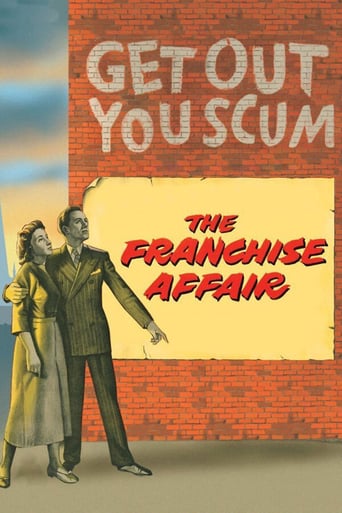

Entertaining from beginning to end, it maintains the spirit of the franchise while establishing it's own seal with a fun cast
... View MoreBlistering performances.
... View MoreBy the time the dramatic fireworks start popping off, each one feels earned.
... View More.Like the great film, it's made with a great deal of visible affection both in front of and behind the camera.
... View MoreYet another Network reissue from those long-gone days when the cinema- going public were much more unsophisticated so that probably a good ninety per cent of them would have no idea how the schoolgirl Betty Kane was privy to so much verifiable information about a house which, as it was ultimately proved in court, she had never set foot inside let alone been held captive there for several weeks. If you shot the same story today it's unlikely that the same ninety per cent of viewers would fail to work out within two reels how Kane was able to pull it off. But this of course is part of its charm, the depiction of a lost era where cynicism was all but unknown. It's undeniable that leading man Michael Dennison is yet another graduate of the Forestry Commission School of Acting but he is surrounded by several popular faces of the day, a strong script and a cameraman who knows how to remove the lens cap prior to focusing. All in all a pleasant, entertaining film.
... View MoreJosephine Tey combined detective fiction with good literature - she didn't crank out "who done its" to feed a greedy public. Her first book "The Man in the Queue" (1929) introduced urbane Detective Inspector Alan Grant and also incorporated a theatrical back- ground that she used again in "A Shilling For Candles". After that she alternated with historical novels until her death in 1951 and, of course, that was when her fiction really took off. Alfred Hitchcock had adapted her book "A Shilling for Candles" into the movie "Young and Innocent" (1937), one of his most light hearted movies starring Nova Pilbeam. "The Franchise Affair" also had a historical significance as it was based on a notorious 18th century case involving Elizabeth Canning.A young traumatized girl runs through the storm and into her guardian's arms. The next day, Robert Blair (Michael Denison), a local solicitor, is telephoned by Marion Sharpe (Dulcie Grey) who lives at the Franchise (a source of gossip in the town). She and her frail mother (Marjorie Fielding) have been accused of kidnapping and beating a young girl, Betty Kane (Ann Stephens). Betty is bought to the Franchise to identify them, which she does with amazing accuracy - even to the tiny attic, the broken window and the car's painted tyres!!! Her brother goes to the press and the papers have a field day - accusations run riot!!Blair starts to interview all the people connected with Betty - and he starts to piece together a story of a secretive girl who has a photographic memory!! It is such a superior British crime film, the kind they make so well, where clues and witnesses are followed up, towards a surprising ending. Instead of Michael Denison, it is usually John Mills. A witness comes forward - on Betty's side, but she is proved to be a girl with a grudge - she had previously worked for the Franchise but was sacked because of theft. Suddenly Betty is identified - not at a tea shop but by a waiter at a hotel, and not as a sweet schoolgirl, but as a made up tart who is not above picking men up!!!This movie was another screen teaming for husband and wife stars, Michael Denison and Dulcie Grey. Inspector Grant is only a minor character in this movie. Along with "Brat Farrer" this is probably my most favourite mystery book and it has been made into a splendid film.Highly, Highly Recommended.
... View MoreI would not be put off from watching this very enjoyable movie by some of the opinions posted here. THE FRANCHISE AFFAIR is a movie you should seek out because it is, simply, very well made.The 1951 film was based on the Josephine Tey novel - recently voted by the Crime Writer's Association as one of the Top 100 Crime Novels of All Time - and her novel was in turn based on a true 18th century case, that of Elizabeth Canning. Canning was a woman who accused two other women of kidnapping her and forcing her to become a prostitute. As the evidence against them grows a lawyer very reluctantly agrees to take on their case.The film was made in moody black and white, nicely photographed by Gunther Krampf, a cameraman who began his career shooting beautiful silent films in Germany before emigrating to Britain in the late 1930s. His work has graced many a film. The story was updated by author Tey to the present time and the movie presents pleasant views of English village life in the 1940s. The script is extremely well-written. True, it contains a good deal of dialog, literate dialog I might add, but I believe this enhances the story-telling in the picture rather than takes away from it.The acting is, as always with films made in the golden years of British film making, top-notch. I was more than a little amused by the criticism of one writer on this site who disparaged Mr Denison's acting and of another who called the acting "stilted". I suppose if one is accustomed to the hilarious, idiotically over-the-top acting style of today it is hard to adjust to genuinely fine acting. Again, do not be put off by comments like this: the acting is first-rate all down the line. Look for future British film stars in small roles here and there, and relish the delightfully dotty performance of the great Athene Seyler as the lawyer's mother. Such witty and well-judged performances like those are always worth a look.THE FRANCHISE AFFAIR is very highly recommended.
... View MoreTHE FRANCHISE AFFAIR Aspect ratio: 1.37:1Sound format: Mono(Black and white)Though based on real events which took place in the 19th century, when a young girl accused two women of kidnapping and abusing her, THE FRANCHISE AFFAIR is ultimately a disappointment. The premise is sound and the film paints a disapproving picture of lynch-mob mentality, but the whole thing is scuttled by Michael Dennison's dreadful performance in the lead. His stiff-necked delivery lacks vitality and passion, and director Lawrence Huntington stages the entire picture like a piece of theatre, lining his characters in front of an apparently immovable camera and allowing dialogue to carry the 'action'. It's all frightfully, frightfully British, of course (Dennison's proposal of marriage to Dulcie Gray is an inadvertent laff riot), and much too stiff and formal. That said, the central narrative is unusual and compelling, though the script makes a dubious attempt to resolve the real-life mystery upon which the film is based.
... View More